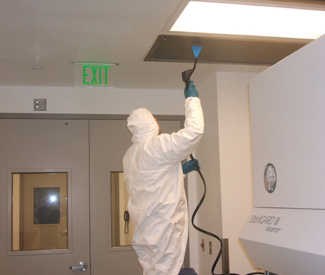Certification
Quality Solutions provides the following USP USP<797>/<800> certification services:
Biological Safety Cabinets
BSCs are used in critical environments to protect both product and the operator. In accordance with regulatory standards, BSCs must be certified at time of installation and at 6-month intervals thereafter. Re-certification must be performed whenever HEPA filters are changed, repairs are made, or relocated.
- • Airflow smoke pattern test
- • Downflow test
- • Downflow velocity profile
- • HEPA filter leak/challenge test
- • Inflow face velocity test
- • Non-viable airborne particle count testing
- • Sash seal test
- • Site installation assessment tests (only done if cabinet is new or moved)
- • Viewscreen retention test
- • Work opening edge retention test
Laminar Flow Hoods/Clean Benches
Laminar Flow Hoods or Clean Benches are used in critical environments to protect product from contaminants. In accordance with regulatory standards, Laminar Flow Hoods must be certified at time of installation and at 6-month intervals thereafter. In addition, re-certification must be performed whenever HEPA filters are changed, repairs are made, or relocated.
- Tests include:
- • Air velocity (face velocity) test
- • HEPA filter leak/challenge test
- • Non-viable airborne particle count
- • Smoke Pattern Testing
High Efficiency Particulate Air (HEPA) Filter Leak Testing
HEPA Filters are used in applications where clean air is required. By definition, a HEPA filter is a dry type filter in a rigid frame, having a minimum particle collection efficiency of 99.97% on 0.3 microns particles of Poly Alpha Olefin (PAO) or similar non-carcinogenic chemicals.
- • Acceptable design leakage percentage
- • Actual leakage measured
- • Upstream aerosol challenge concentration
Cleanroom Certification
- Tests include:
- • Airborne & Surface Viable Particle Sampling
- • Airflow Velocity / Volume Testing
- • HEPA Filter Leak / Challenge Testing
- • Non-Viable Airborne Particle Count Testing
- • Room Air Change Rate(s)
- • Room Differential Pressure Testing
- • Temperature / Relative Humidity Testing (if not monitoring available)
- • Testing of Primary Engineering Controls (PEC) or containment devices within the cleanroom space(s): Biological Safety Cabinets, Laminar Flow Hoods, Chemical Fume Hoods, etc.
Compounding Isolators (Gloveboxes) Testing & Certification
Compounding Isolators play an important role in compounding pharmacies. A Compounding Isolator separates a product or process from its production equipment, technical personnel, and surrounding work environment. They are used in applications requiring a high degree of protection from external elements or contaminants, and can serve as alternatives to sophisticated cleanrooms. As a result, Isolators need specific procedures for cleaning and operation to ensure they maintain an aseptic environment during transfer and production.
In accordance with regulatory standards, Compounding Isolators must be certified at the time of installation and at least every 6-months thereafter. In addition, re-certification should be performed whenever HEPA filters are changed, repairs are made, or the isolator is relocated. More frequent re-certification intervals should be considered for particularly hazardous or critical applications or workloads.
- • Airflow smoke pattern test
- • Airflow (velocity) tests must be performed for each:
- - Egress Opening
- - Main Work Chamber
- - Pass-through Chamber
- - Pass-through Opening/Transfer Door
- • Chamber Pressure Testing – Main Chamber & Pass-through.
- • HEPA filter leak/challenge test (Integrity Test)
- • Non-viable airborne particle count test
- • Particle Contaminant Integrity and Enclosure Leak Test
- • Preparation Ingress/Egress Test
- • Site installation assessment tests
- • Viable Air Sampling
- • Viable Surface Sampling
In addition, Isolators require an environmental sampling plan to ensure that they maintain an aseptic environment for CSP production. Quality Solutions works with our clients to develop an appropriate, USP-compliant sampling plan based on the individual equipment and its use in the compounding pharmacy.
Visual Airflow Characterization (Smoke Studies)
Through smoke studies, we can visually characterize the airflow direction throughout, and contiguous to, the work zone and critical areas within the cleanroom. The test verifies that a cleanroom is capable of controlling dispersion of the air stream and verifying that critical areas are not negatively impacted by airflow patterns in the room.

